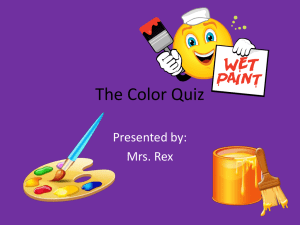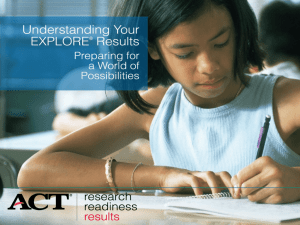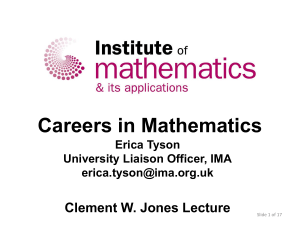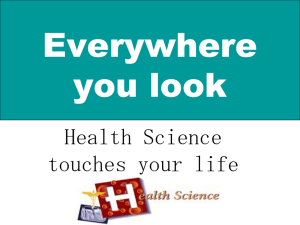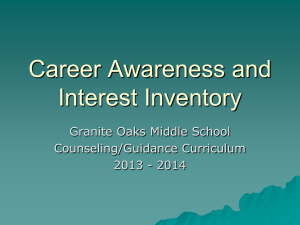2 MB - Cegnet
advertisement
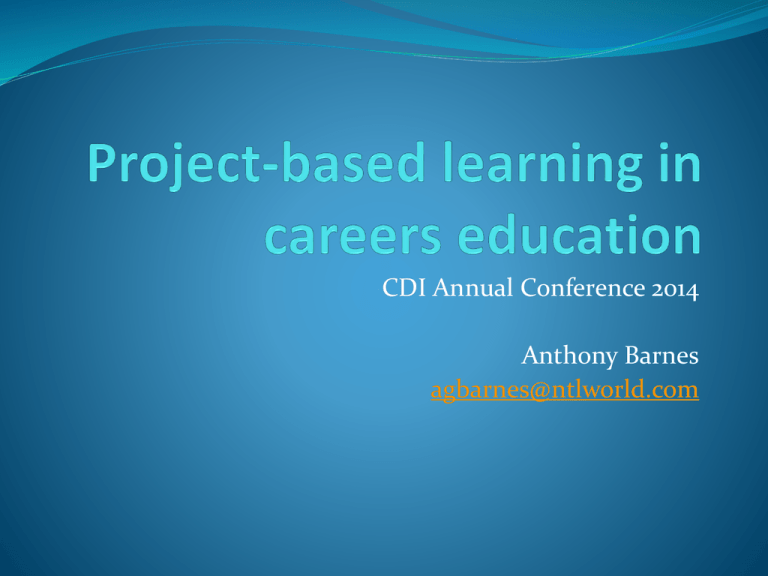
CDI Annual Conference 2014 Anthony Barnes agbarnes@ntlworld.com Worksheets and checklists can lead to unrewarding learning! Project-based learning takes the learning deeper (See Mihaly Csikszentmihalyi’s work on flow) Themes of this workshop Better careers teaching Careers projects Careers homework Careers competitions and challenges These factors have an impact on learning (two high, two medium and two low) High expectations Homework Ability grouping Student control over learning Teacher-student relationships Computer-assisted instruction Teaching for impact (Hattie) High Medium Low High expectations Homework Ability grouping Teacher-student relationships Computer-assisted instruction Student control over learning Project-based learning has a medium impact. How can we improve the effectiveness of this approach when we use it? Effective teaching must-reads Inspiring teachers: perspectives and practices (CfBT) http://bit.ly/1vP79A2 What makes great teaching? (Sutton Trust) http://www.suttontrust.com/wpcontent/uploads/2014/10/Whatmakes-great-teaching-FINAL4.11.14.pdf Visible Learning for Teachers – John Hattie (Routledge, 2012) Mapping of seminal reports on good teaching (NFER) http://www.nfer.ac.uk/publications/R SGT01/RSGT01.pdf What makes great teaching? The six components of great teaching: Deep subject knowledge Quality of instruction Classroom climate (expectations, correct use of praise, etc.) Classroom management (use of time, management of behaviour) Teacher beliefs (theories and models they use) Professional behaviours (reflecting on practice, collaborating with colleagues) Careers teaching must-reads ACEG Framework (CDI) http://www.thecdi.net/write/CWRE_ User_Guide.pdf Good Career Guidance (Gatsby) http://www.gatsby.org.uk/en/Educatio n/Projects/Good-CareerGuidance.aspx Careers 2020 (Pearson/ICeGS) http://www.derby.ac.uk/files/careers_ 2020_.pdf An introduction to career learning and development – Anthony Barnes et al. (Routledge, 2011) A practical guide to career learning and development – Barbara Bassot et al. (Routledge, 2014) Learning model Encouraging professional reflection A session that went well – What did you do? In pairs ‘A’ talks about a session that went well while ‘B’ listens and records the skills that ‘A’ used. Then ‘B’ feeds back to ‘A’ and they discuss what worked and what could be done to even better next time ‘B’ now has a turn A useful guide to project-based learning ‘Project-based learning’ refers to students designing, planning, and carrying out an extended project that produces a publicly-exhibited output such as a product, publication, or presentation http://www.innovationunit.org/sites/default/files/Teacher's%20Guide%20to%20Project-based%20Learning.pdf Project planner (from Work That Matters) – the importance of essential questions, critique sessions, several drafts and an exhibition) 1. 2. 3. 4. 5. 6. 7. 8. 9. Summary - What are your students going to do, and why are they doing it? Essential questions - An essential question should inspire students, require them to conduct serious research, and relate to a real world issue Products - What do you want students to do / write / create / build? Learning goals - What do you want students to learn? Timeline/milestones - List the key dates and important milestones for this project (eg check-ins, critique sessions, deadlines for drafts and specific product components) Personalisation - Say how you will personalise the project, especially for individual students who will need specialized support Exhibition venue - Where will the exhibition take place? Exhibition plan - How will the exhibition be promoted? How will your students exhibit their work? Who will you be inviting? Assessment criteria - How will you be assessing the learning goals you identified? Challenge-based Learning (CBL) from Apple Stage One a big idea an essential question a challenge Stage Two guiding questions activities and resources Stage Three determining and articulating the solution Stage Four implement the solution evaluate the results The process also integrates important ongoing activities such as reflection, assessment, and documentation (Apple Inc.) https://www.challengebasedlearning.org/pages/welcome The importance of challenge examples A big idea Sustainability Future of work Essential question What is the impact Why are ‘jobs for of economic life’ disappearing? development on the environment? What makes people happy at work? The challenge Increase the percentage of students in your school who say they want to work in greener ways when they get into a job Improve the level of satisfaction of people who work in your school Create opportunities for students to discuss this issue with people from outside school Wellbeing WebQuests Emphasises information use rather than information gathering and usually collaborative http://en.wikipedia.org/wiki/WebQuest Imperial War Museum http://nmolp.iwm.org.uk/webquests/ San Diego State University www.webquest.org Level 3 Extended Project Qualification http://www.manchester.ac.uk/connect/teachers/students/post-16/extended-project/resources/ Homework (John Hattie) A model for extended careers homeworks Set assignment Provide support 2-6 weeks to complete (lessons, drop-in sessions, a careers homework club) Make it a collaborative learning activity Signpost resources Use assessment for learning methods in providing feedback Facilitate reflection and follow-up by students My career story – idea for an extended homework project My values My qualities My interests My attitudes What Am I like? My health My career beliefs What my career means to me My definitions What progress am I making? My reviews Personal statement Subjects Qualifications What am I good at? My career story Skills Experiences and achievements What Plans do I have? My options My goals and targets My CV My learning plan/pathway Essential questions What really matters? Who am I? Who do I want to be? What do I know? What are my choices? Is this forever? Who can help me? How can I help myself? / Make it happen? What can I expect from my organisation? The wheel of life tool is a resource http://www.mindtools.com/pages/article/newHTE_93 .htm http://www.thecoachingtoolscompany.com/free_resou rces/wheel-of-life-coaching-tool/ http://www.thecoaches.com/docs/resources/toolkit/p dfs/18-Wheel-of-Life-Exercise.pdf Project questions - examples Whose career is it anyway? (Does it belong to me or the organisation I work for?) What jobs can you do in a hospital if you don’t want to do medicine or nursing? What should you know about working for a charity? What are uniforms for? Is a career as a child labourer a contradiction in terms? Who carries their career secrets to the grave? What makes someone employable? What would you do to smash the glass ceiling? Interview someone about their job Growing up, did you always want to do what you’re doing now? What made you realise that this was the career for you? What was involved in getting the qualifications you need? What’s a typical day like? What still attracts you about your job? What is challenging about the job you do? What’s been the highlight of your career so far? What advice would you give to anyone thinking of following in your footsteps? Competitions - checklist Arrange sponsors Make it annual (linked to a national awareness event?) Write rules and entry form Organise publicity Provide briefing sessions and tips and resources Plan presentation of prizes MyKindaCrowd http://www.mykindacrowd.com/ Competitions and challenges Design a careers game Produce a resource for young people on a given topic Essay prize – Should a medical graduate automatically be obliged to work as a doctor? Careers fair challenges, e.g. name two organisations that offer apprenticeships to young people
